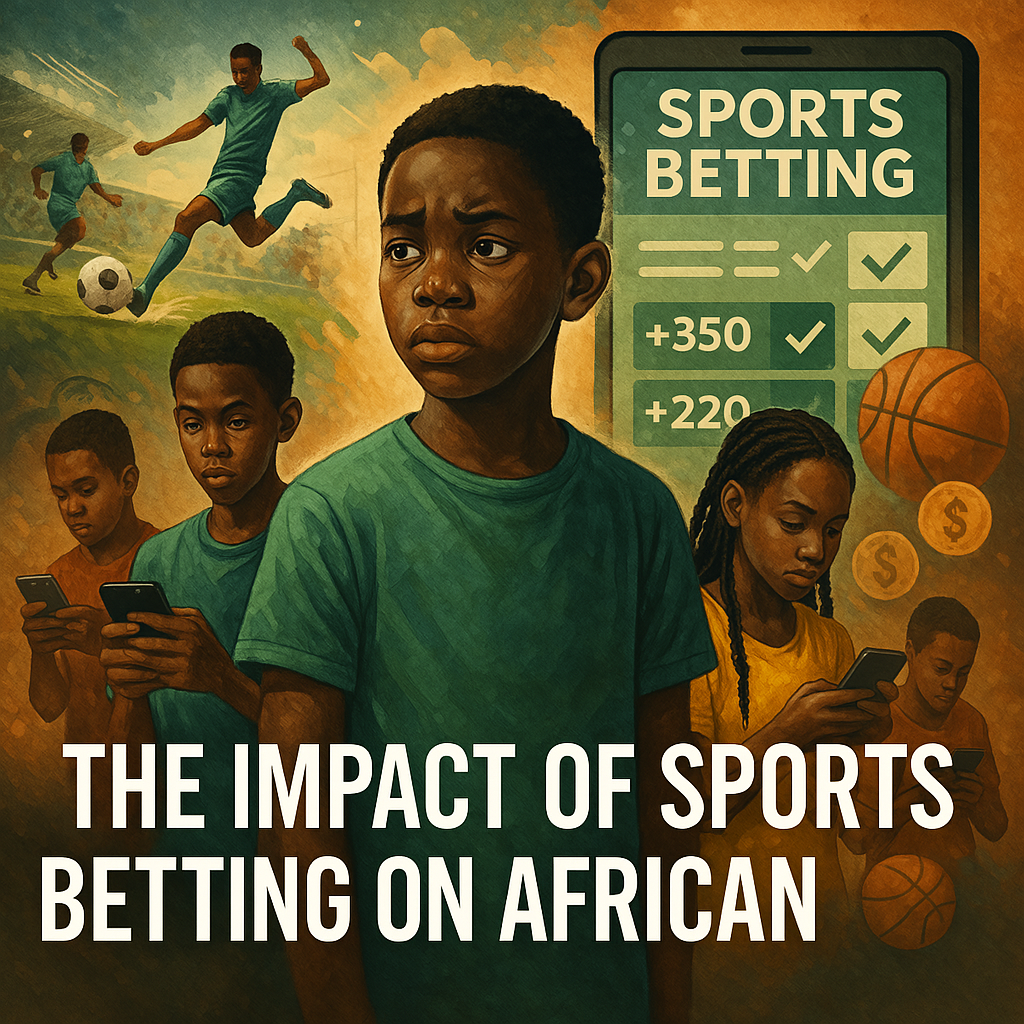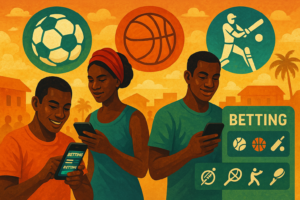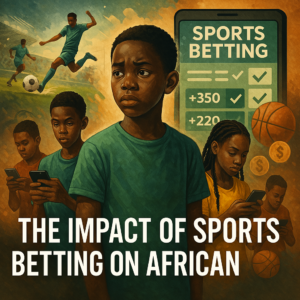
The landscape of entertainment and economic activity in Africa has been dramatically transformed by the rapid proliferation of sports betting over the past decade. What began as a niche pastime has evolved into a mainstream cultural phenomenon that particularly captivates the youth demographic across the continent. From Nigeria to Kenya, South Africa to Ghana, young Africans between the ages of 18 and 35 have embraced sports betting with unprecedented enthusiasm, driven by the perfect storm of widespread smartphone adoption, expanding internet penetration, and the continent’s deep-rooted passion for sports, especially football. This surge in popularity has not occurred in isolation but reflects broader socioeconomic realities faced by African youth, including high unemployment rates, limited economic opportunities, and the allure of quick financial gains. As betting companies aggressively target young consumers through sophisticated marketing campaigns and convenient mobile platforms, understanding the multifaceted implications of this trend has become increasingly crucial for parents, educators, policymakers, and public health officials concerned with the wellbeing of Africa’s next generation.
Historical Evolution of Sports Betting in Africa
The journey of sports betting across the African continent represents a fascinating evolution from informal gambling practices to a sophisticated, technology-driven industry that has reshaped entertainment and economic landscapes. Understanding this transformation provides crucial context for analyzing its current impact on youth populations.
Colonial Roots and Traditional Gambling
Long before the digital revolution, gambling existed in various traditional forms across African societies. Colonial influences introduced formalized betting structures, primarily through horse racing in countries with significant British presence like South Africa, Kenya, and Nigeria. These establishments initially catered to colonial elites, creating a perception of gambling as an exclusive activity. Traditional forms of gambling, including dice games and community-based betting on local sports, continued to thrive in parallel, deeply embedded in cultural practices across different regions.
The Transition to Modern Betting Infrastructure
The late 1990s and early 2000s marked a significant turning point as international betting operators recognized the untapped potential of African markets. This period saw the establishment of physical betting shops in urban centers, creating accessible venues that normalized sports betting as a legitimate recreational activity. Countries like Nigeria, Ghana, and Kenya led this transformation, witnessing rapid expansion of betting shop networks that became familiar fixtures in urban landscapes. This physical infrastructure laid the groundwork for what would soon become a digital revolution in African betting practices.
Digital Revolution and Mobile Betting Explosion
The true catalyst for widespread adoption came with the digital revolution of the 2010s, coinciding with Africa’s mobile technology boom. As smartphone penetration increased exponentially across the continent, betting operators pivoted toward mobile platforms, effectively placing betting opportunities in the pockets of millions of young Africans. The introduction of mobile money services like M-Pesa in Kenya removed traditional banking barriers, creating frictionless payment systems that facilitated instant deposits and withdrawals. This technological convergence democratized access to betting opportunities, transforming what was once restricted by physical infrastructure into an activity accessible from virtually anywhere with mobile connectivity.
The historical trajectory reveals how sports betting in Africa evolved from marginal activity to mainstream phenomenon, particularly among youth demographics. This evolution has been characterized by increasing accessibility, technological integration, and cultural normalization – laying the foundation for the complex social dynamic observed today. The rapid pace of this transformation has outstripped regulatory frameworks in many countries, creating a scenario where widespread adoption preceded comprehensive understanding of its societal implications.
Key Factors Driving Youth Participation in Sports Betting
The remarkable surge in sports betting participation among African youth can be attributed to a complex interplay of technological, economic, social, and psychological factors that have created a perfect environment for the industry’s explosive growth. Understanding these driving forces is essential for developing effective responses to the challenges posed by this phenomenon.
The technological revolution across Africa has fundamentally altered how young people engage with sports betting. The continent has experienced remarkable mobile penetration rates, with affordable smartphones becoming increasingly accessible even in lower-income communities. This technological accessibility has coincided with expanding internet coverage and decreasing data costs, removing traditional barriers to participation. Mobile betting platforms have capitalized on this shift by developing lightweight applications optimized for basic smartphones and offering “data-free” betting options that don’t count against users’ data plans. The integration with mobile money services has created frictionless payment systems that eliminate the need for traditional banking relationships, allowing instantaneous transactions that make the betting experience seamless and immediate.
- High youth unemployment rates across many African countries create economic desperation that makes betting appear as a viable income source
- Success stories of large wins shared through social media create powerful narratives of potential financial transformation
- Aggressive marketing by betting companies specifically targets youth demographics with aspirational messaging
- Celebrity endorsements from popular sports figures and entertainers normalize betting as a mainstream activity
- Integration of betting discussions into sports culture makes participation feel like an extension of sports fandom
- Peer pressure within youth social circles reinforces betting as a social activity rather than merely a financial transaction
The psychological appeal of sports betting cannot be underestimated, particularly in contexts where traditional economic advancement paths appear blocked. The activity offers the tantalizing promise of instant financial transformation, creating hope in circumstances where conventional opportunities seem limited. For many young Africans, betting represents not just a game of chance but a perceived strategy for economic advancement. The element of skill involved in sports betting—requiring knowledge of teams, players, and performance statistics—creates an illusion of control that distinguishes it from pure gambling in the minds of participants. This perception of betting as a skill-based activity rather than mere chance further legitimizes participation and encourages sustained engagement even in the face of losses.
These interlocking factors have created an environment where sports betting has become deeply embedded in youth culture across many African nations, posing significant challenges for those concerned with its potential negative consequences while also reflecting the broader socioeconomic realities faced by young people on the continent.
Psychological and Social Impacts on Young Bettors
The psychological and social dimensions of sports betting among African youth represent some of the most profound yet understudied aspects of this growing phenomenon. As betting behavior becomes normalized within youth culture, its effects extend far beyond simple financial transactions to shape mental health outcomes, social relationships, and developmental trajectories.
Addiction Patterns and Mental Health Correlations
The neurological mechanisms that make gambling addictive are particularly potent in developing brains, placing young bettors at heightened risk for problematic gambling behaviors. Research from countries like Kenya and Nigeria has documented concerning patterns of addiction among youth populations, with studies suggesting that early exposure to betting significantly increases lifetime risk of gambling disorders. The psychological impacts manifest in various ways, including anxiety, depression, and obsessive thought patterns centered around betting outcomes. The variable reward schedule inherent in sports betting—where wins are unpredictable but just frequent enough to reinforce continued play—creates powerful conditioning that resembles patterns seen in substance addiction. Mental health resources across many African countries remain inadequate to address these emerging challenges, leaving many young people without proper support systems as they develop problematic relationships with betting.
Transformation of Social Dynamics and Relationships
Sports betting has fundamentally altered social interactions among youth demographics, becoming integrated into friendship networks and peer group activities. Betting discussions now dominate conversations in spaces where young people gather, from university campuses to informal social settings. This normalization creates implicit pressure to participate, with non-bettors potentially experiencing social exclusion. Concerning evidence suggests that betting has begun to transform family dynamics as well, with reports of young people diverting educational funds or household resources toward betting activities. The mentorship relationships traditionally valued in many African communities have been disrupted as young people increasingly seek guidance from successful bettors rather than established community figures.
Identity Formation and Value Systems Shifts
Perhaps most significantly, the prominence of betting culture influences how young Africans conceptualize success, opportunity, and personal agency during crucial identity formation years. The instant-reward paradigm of betting stands in stark contrast to traditional values emphasizing patience, gradual achievement, and community contribution. Young people increasingly report viewing betting as a legitimate career aspiration rather than merely recreational activity, signaling a profound shift in how opportunity and success are conceptualized. The emphasis on financial outcomes above all else risks undermining educational motivation, as the uncertain but immediate potential rewards of betting compete with the delayed gratification of academic achievement.
The psychological and social impacts of sports betting extend far beyond individual bettors to reshape community norms, interpersonal relationships, and collective values. These transformations warrant careful attention from mental health professionals, educators, and community leaders concerned with youth development across the continent. Without appropriate intervention strategies, there exists significant risk that these impacts will compound over time, creating intergenerational patterns of gambling-related harm in communities already facing numerous development challenges.
Economic Implications for African Communities
The economic dimensions of sports betting in Africa extend far beyond individual transactions to influence broader community development patterns, household economics, and national revenue structures. These implications present a complex mixture of benefits and challenges that require nuanced analysis.
At the macroeconomic level, the sports betting industry has undeniably generated significant economic activity across numerous African nations. Betting companies have emerged as major employers, creating thousands of direct jobs in operations, marketing, customer service, and technology development. The sector has stimulated adjacent industries including telecommunications, digital payment systems, and advertising, contributing to broader economic ecosystems. Tax revenue from regulated betting operations has become an increasingly significant contributor to national budgets in countries like Kenya, Ghana, and Nigeria, where governments have implemented specific taxation frameworks for gambling proceeds. This revenue stream has grown particularly valuable for governments facing challenges in expanding their traditional tax bases.
However, these apparent economic benefits must be weighed against more troubling patterns at household and community levels:
- Research indicates that betting participation is highest among lower-income youth, with studies in Kenya suggesting that unemployed young men spend an average of $50 monthly on betting despite having limited disposable income.
- Household surveys reveal concerning patterns of resource diversion, with educational funds, business capital, and essential household expenses being redirected toward betting activities in economically vulnerable families.
- The economic sustainability of betting-derived tax revenue remains questionable, particularly as it potentially extracts resources from communities that might otherwise support local business development and consumption.
- The industry’s expansion may create a form of economic dependence that undermines more sustainable development paths by normalizing speculation over productivity.
- Capital outflows represent a significant concern, as many betting operations are owned by international companies that repatriate profits to parent companies outside Africa, limiting local economic benefits.
The distributional consequences of betting activity reveal perhaps the most troubling aspect of its economic impact. Evidence suggests that betting activities effectively function as a regressive economic force, with lower-income participants contributing disproportionately to industry revenues while being least able to absorb losses. This pattern risks exacerbating existing economic inequalities rather than alleviating them, despite industry narratives that often frame betting as an economic opportunity. Community economic development specialists have raised concerns that the normalization of betting diverts attention and resources from more sustainable economic activities that could build genuine community wealth through productive enterprise.
A comprehensive economic analysis must recognize both the visible benefits in terms of employment and tax revenue while acknowledging the less visible but potentially more significant costs to household economic resilience and community development trajectories. This balanced assessment should inform policy approaches that maximize positive economic contributions while mitigating harmful impacts on vulnerable populations.
Regulatory Frameworks and Protective Measures
The regulatory landscape governing sports betting across Africa presents a patchwork of approaches that reflect varying national priorities, administrative capacities, and cultural attitudes toward gambling activities. As the industry has rapidly expanded, regulatory frameworks have struggled to keep pace, creating significant challenges for youth protection.
Most African nations have established some form of regulatory oversight for betting operations, typically through specialized gambling authorities or commissions empowered to issue licenses, monitor compliance, and enforce standards. These frameworks generally focus on operator licensing, taxation structures, anti-money laundering provisions, and basic consumer protection measures. However, the effectiveness of these regulations varies dramatically across the continent, with significant implementation gaps even in countries with seemingly robust written policies. Resource constraints often limit regulatory bodies’ ability to monitor compliance effectively, particularly as betting increasingly moves into digital spaces that transcend traditional regulatory approaches.
Youth protection measures represent a particularly challenging aspect of regulatory frameworks. Age verification systems remain inconsistent across platforms, with digital operations especially difficult to monitor. Some progressive regulatory approaches have emerged that deserve broader consideration:
- Mandatory integration of responsible gambling tools including deposit limits, self-exclusion options, and cooling-off periods
- Requirements for operators to identify and intervene with patterns suggesting problem gambling behavior
- Advertising restrictions specifically targeting youth-oriented media channels and content
- Mandatory allocation of percentage of betting revenue toward addiction treatment and prevention programs
- Educational campaigns integrated into school curricula addressing gambling risks from early adolescence
- Coordinated cross-border regulatory approaches to address challenges of international betting platforms
Civil society organizations have emerged as crucial actors in the regulatory ecosystem, often driving advocacy for stronger protections and highlighting implementation gaps in existing frameworks. These organizations frequently lead research efforts to document betting-related harms, provide evidence-based recommendations for policy improvements, and offer direct support services for affected youth. Their work has proven vital in contexts where government capacity for comprehensive regulation remains limited.
The regulatory challenges extend beyond national boundaries, as digital platforms enable cross-border betting activities that complicate traditional regulatory approaches. Regional coordination efforts through bodies like the African Union and regional economic communities have begun addressing these transnational dimensions, though comprehensive frameworks remain aspirational rather than operational in most regions.
Effective regulation must balance multiple objectives: protecting vulnerable youth from betting-related harms, capturing economic benefits through appropriate taxation, preventing criminal exploitation of betting systems, and respecting individual freedoms. Finding this balance requires ongoing dialogue between government authorities, industry representatives, public health experts, and youth advocates to develop responsive regulatory approaches that address emerging challenges while recognizing the complex social reality of betting’s integration into youth culture.
Sustainable Solutions and Future Directions
Addressing the complex challenges presented by youth sports betting in Africa demands multidimensional approaches that recognize both immediate harm reduction needs and longer-term cultural and economic transformations. Sustainable solutions must engage stakeholders across sectors while acknowledging the legitimate recreational aspects of betting alongside its potential harms.
Educational interventions represent a critical foundation for any comprehensive strategy. Evidence-based gambling literacy programs integrated into school curricula can equip young people with critical thinking skills to evaluate betting marketing, understand probability concepts, and recognize early warning signs of problematic behavior. These programs prove most effective when they avoid simplistic “just say no” messaging in favor of nuanced approaches that acknowledge betting’s appeal while fostering informed decision-making. Digital literacy components are equally important, helping youth critically evaluate the sophisticated marketing tactics employed by betting companies across social media and online platforms.
Technology-based solutions offer promising avenues for harm reduction by leveraging the same digital infrastructure that has facilitated betting’s expansion. Innovations in this space include machine learning algorithms that identify problematic betting patterns and trigger intervention protocols, blocking software that limits access to betting platforms during designated study hours, and digital tools that visualize long-term betting losses to counter cognitive biases that maintain problematic gambling. The most successful interventions integrate these technological approaches within broader support systems rather than relying on technology alone.
Economic opportunities remain fundamental to addressing the underlying conditions that make betting appealing as a perceived path to financial advancement. Programs that connect youth with genuine economic alternatives—including entrepreneurship training, digital skills development, and apprenticeship opportunities—address root causes rather than merely symptoms. Community-based financial literacy initiatives that emphasize long-term wealth building over speculation have demonstrated particular promise in redirecting youth energy toward sustainable economic activities.
The path forward requires careful balance between recognizing individual agency and acknowledging the structural factors that shape betting behaviors. Approaches that stigmatize young bettors or frame the issue exclusively as individual moral failing ignore the complex socioeconomic context in which betting behaviors develop. Similarly, purely structural approaches that remove all responsibility from individual actors risk disempowering the very youth they aim to support.
As Africa continues its demographic transition toward an increasingly youthful population, the question of how sports betting integrates into youth culture and economic life will only grow in importance. By developing context-appropriate responses that engage young people as partners rather than problems to be solved, communities can work toward healthier relationships with betting activities while preserving the social connectivity and entertainment value that initially made them attractive. The most promising initiatives maintain this balance—addressing real harms while acknowledging the legitimate social functions that betting has come to serve in many youth communities across the continent.
Beyond Intervention: Building Resilient Youth Communities
The long-term vision for addressing sports betting impacts on African youth extends beyond reactive measures to encompass proactive community building that fosters resilience against problematic gambling behaviors. This approach recognizes that sustainable change requires not just restricting harmful activities but creating compelling alternatives that address the underlying needs betting currently fulfills.
Community sports programs represent particularly promising interventions, providing the excitement and social connection that attract many youth to betting while channeling energy toward physical activity rather than gambling. When these programs intentionally incorporate mentorship components and leadership development, they create pathways for positive identity formation that compete directly with the identity offers of betting culture. The most successful initiatives combine sports participation with structured opportunities for reflection on values, teamwork, and personal growth, creating multidimensional engagement that addresses both recreational needs and deeper psychological development.
The digital revolution that facilitated betting’s expansion also offers unprecedented opportunities for youth innovation, creativity, and connection. Investment in youth-led digital content creation, tech entrepreneurship incubators, and digital skills development creates alternative avenues for the technological engagement many young people initially find through betting platforms. These initiatives prove most effective when they incorporate near-term rewards and social recognition that compete with the immediate gratification betting provides while simultaneously building toward longer-term skills development.





